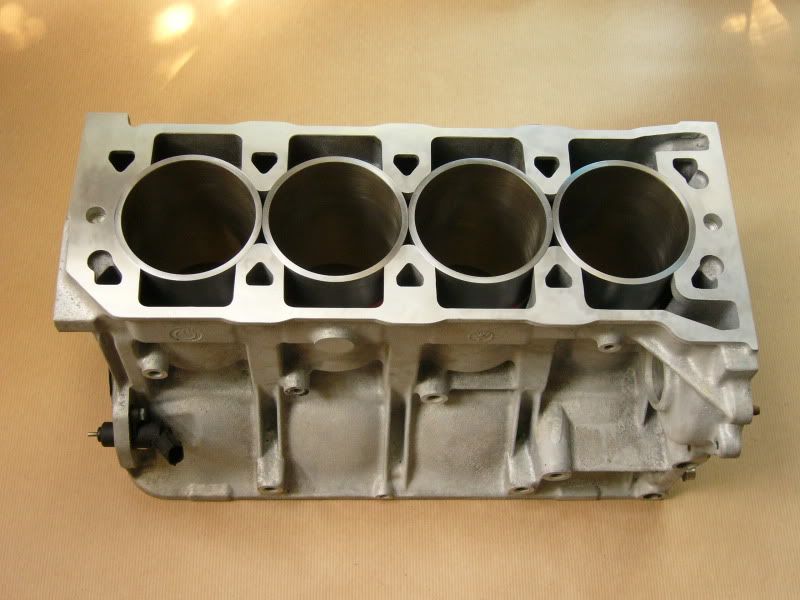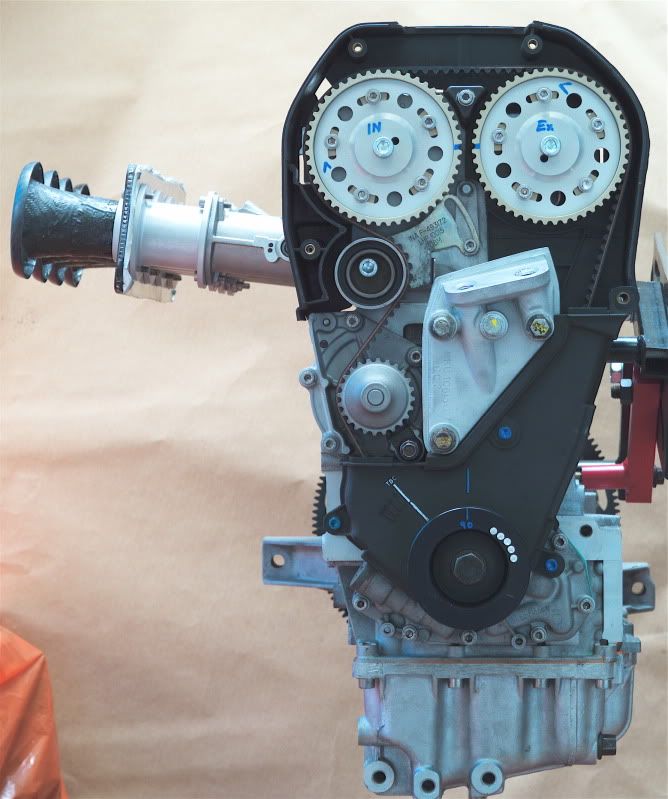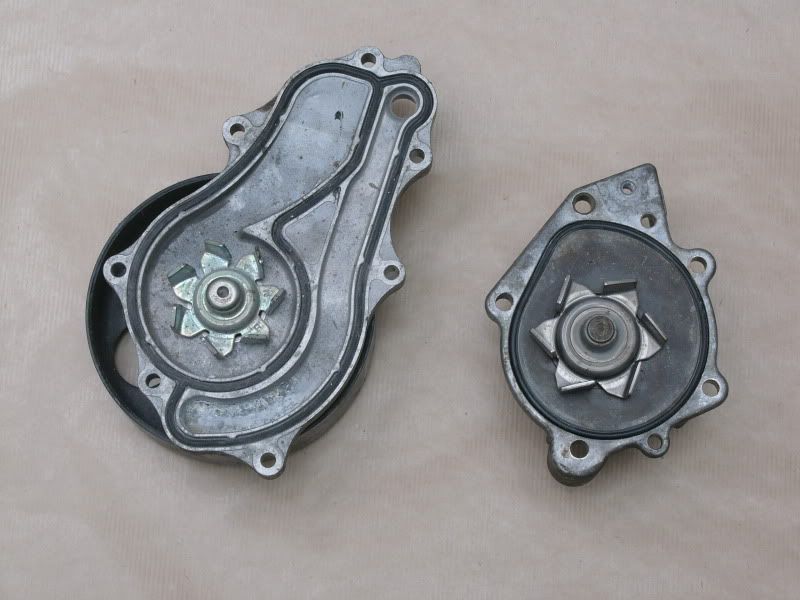Why I don't like [what gets done to] the Rover K series and
-
KingK_series
- Posts: 567
- Joined: Tue Jan 05, 2010 10:10 am
Why I don't like [what gets done to] the Rover K series and
I have to ask, what exactly was the point in allowing this thread in the first place? it;s not like anybody is going to learn anything remotely useful or accurate, so what was the point?
How would a thread entitled 'why I don't like the Rover K series' have gone down?
So here we go, in response to the above comment from the K20 thread, a purely technical examination of the Rover engine.
How would a thread entitled 'why I don't like the Rover K series' have gone down?
So here we go, in response to the above comment from the K20 thread, a purely technical examination of the Rover engine.
-
KingK_series
- Posts: 567
- Joined: Tue Jan 05, 2010 10:10 am
Re: Why I don't like [what gets done to] the Rover K series
So to the problems with the engine - most people start looking at alternative engines when their K suffers so called "HGF", so there is no point trying to pretend there are not issues with this engine. So what is the problem, well I am writing a book, and I need to rewrite the KingK essay to bring it up to date with all my work in the last five years, but here is a list.
The problem that CAUSES the gasket to fail, is thermal distortion of the head. Why is it a particular problem in The K series......

.... because the water flow through the engine is not well managed, above one of my first engines, modifying what you see there is the only way to significantly change the issue of cause.
Below is a pic of a head had been expensively ported and modified, some of the modifications to the waterways help, some actually make matters worse, - this is the Achilles heal of this engine - water management through the head and block.

The problem that CAUSES the gasket to fail, is thermal distortion of the head. Why is it a particular problem in The K series......

.... because the water flow through the engine is not well managed, above one of my first engines, modifying what you see there is the only way to significantly change the issue of cause.
Below is a pic of a head had been expensively ported and modified, some of the modifications to the waterways help, some actually make matters worse, - this is the Achilles heal of this engine - water management through the head and block.
Last edited by KingK_series on Sat Dec 24, 2011 2:33 pm, edited 1 time in total.
Re: Why I don't like [what gets done to] the Rover K series
Are we going to be talking design, materials, build tolerances or a combination of things?
I read a lot of things that say the engine concept is brilliant but a lot of voodoo about why it has the reputation it does.
Looking forward to this thread.
I read a lot of things that say the engine concept is brilliant but a lot of voodoo about why it has the reputation it does.
Looking forward to this thread.
-
KingK_series
- Posts: 567
- Joined: Tue Jan 05, 2010 10:10 am
Re: Why I don't like [what gets done to] the Rover K series
Pic of one of my earlier engines. Showing what is also another problem on the K.

- the water pump, - it is a cheap pressed affair [like the Honda k20a2] which creates much cavitation, like the Honda it spins too fast, and whilst the honda has issues because of it's cheap pump, they are managed because of the sheer weight and strength of the block. The K like a proper competition engine needs a better pump that will not cavitate, and create higher flow and pressure around the tops of the cylinders and in the head

- the water pump, - it is a cheap pressed affair [like the Honda k20a2] which creates much cavitation, like the Honda it spins too fast, and whilst the honda has issues because of it's cheap pump, they are managed because of the sheer weight and strength of the block. The K like a proper competition engine needs a better pump that will not cavitate, and create higher flow and pressure around the tops of the cylinders and in the head
Re: Why I don't like [what gets done to] the Rover K series
A list of the issues is really informative, but I take it we'll have to wait for the book to get the answers to these problems?
EDIT: just for clarity on the intent of the statement above, that's fair enough and I would probably be interested in reading about it. Out of interest, will the book cover various solutions of different complexity and cost so that smaller cheaper improvements could be achieved if that was all that was possible?
EDIT: just for clarity on the intent of the statement above, that's fair enough and I would probably be interested in reading about it. Out of interest, will the book cover various solutions of different complexity and cost so that smaller cheaper improvements could be achieved if that was all that was possible?
-
KingK_series
- Posts: 567
- Joined: Tue Jan 05, 2010 10:10 am
Re: Why I don't like [what gets done to] the Rover K series
Ferg wrote:A list of the issues is really informative, but I take it we'll have to wait for the book to get the answers to these problems?
EDIT: just for clarity on the intent of the statement above, that's fair enough and I would probably be interested in reading about it. Out of interest, will the book cover various solutions of different complexity and cost so that smaller cheaper improvements could be achieved if that was all that was possible?
The way to manage the problem is to use a 82 deg PRT, the solution is a competition water pump, and manipulating the flow through the block, both of which I am going to keep quiet for now, mostly so that one or two individuals cannot hijack the work as happened with the single piston tests for counterweight on the stock crank.
-
KingK_series
- Posts: 567
- Joined: Tue Jan 05, 2010 10:10 am
Re: Why I don't like [what gets done to] the Rover K series
the honda K20 and Rover K water pumps next to each other, both cheap poor designs, that in the Rover's case significantly contributes to the temp gradient issues that cause "HGF"
-

-

Re: Why I don't like [what gets done to] the Rover K series
Simon I have a different pump fitted than the one shown ,its the 7 tang impellor one with the tangs angled different from the one posted above , is it any better or worse for cavitation ?
bob
Light travels faster than sound. This is why some people appear bright until you hear them speak
Light travels faster than sound. This is why some people appear bright until you hear them speak
-
KingK_series
- Posts: 567
- Joined: Tue Jan 05, 2010 10:10 am
Re: Why I don't like [what gets done to] the Rover K series
hiscot wrote:Simon I have a different pump fitted than the one shown ,its the 7 tang impellor one with the tangs angled different from the one posted above , is it any better or worse for cavitation ?
That will shift more water if the blade area is greater, but this type of impeller will cavitate badly, it only really works in the 2-4000rpm range - the average speeds that a shopping trolly engine can anticipate.
-
KingK_series
- Posts: 567
- Joined: Tue Jan 05, 2010 10:10 am
Re: Why I don't like [what gets done to] the Rover K series
The biggest problem with K in stock form is the fact that the head is made from a heat treaed alloy, LM25 unlike any other production engine, and whilst this gives huge advantages in reducing the weight of the engine, the sheer unfamiliarity with the nature of an alloy like LM25 at most garages, means that they - and a fair number of specialists are totally unfamiliar with and not equipped to test for head hardness. This involves possession of a hardness tester which are extremely expensive, so most garages/ Lotus specialists are disinclined to acquire then even if familiar with the metallurgical need to test heads when "HGF" has occurred - the result, reoccurring gasket failure. It is not actually a problem with the engine, rather with those servicing it, but it is probably the biggest cause of frustration that owners face.
Re: Why I don't like [what gets done to] the Rover K series
Simon no wonder the head is light, its like an aero bar full of air bubbles I believe even rover wiped the head to seal it
Do you think with the head problems and sinking liners the k series would of made a better engine if it was not LM25
Do you think with the head problems and sinking liners the k series would of made a better engine if it was not LM25
bob
Light travels faster than sound. This is why some people appear bright until you hear them speak
Light travels faster than sound. This is why some people appear bright until you hear them speak
-
KingK_series
- Posts: 567
- Joined: Tue Jan 05, 2010 10:10 am
Re: Why I don't like [what gets done to] the Rover K series
hiscot wrote:Simon no wonder the head is light, its like an aero bar full of air bubbles I believe even rover wiped the head to seal it
Do you think with the head problems and sinking liners the k series would of made a better engine if it was not LM25
Yes - that is not true
All Zeus's castings for Aston Martin and the AMG Mercedes engines are made of LM25
All castings made in every foundry in the world are porous, it is the nature of casting, but the rejection rate at Longbridge was less than 2% after the hydrogen scrubs were introduced after 1996, and that is without ultrasealing.
All this buisness about porous heads was a cover for a few who did not have hardness testers and were refitting soft heads, or were skimming and opening up the headsurface without punch rolling the fireface first. Bob you may remember my post on seloc with pic a while ago and how that has now become common practice -
Re: Why I don't like [what gets done to] the Rover K series
"Bob you may remember my post on seloc with pic a while ago and how that has now become common practice -"
yes I do I think you said f1 engines many many years ago used to peen the head
yes I do I think you said f1 engines many many years ago used to peen the head
bob
Light travels faster than sound. This is why some people appear bright until you hear them speak
Light travels faster than sound. This is why some people appear bright until you hear them speak
-
KingK_series
- Posts: 567
- Joined: Tue Jan 05, 2010 10:10 am
Re: Why I don't like [what gets done to] the Rover K series
hiscot wrote:"Bob you may remember my post on seloc with pic a while ago and how that has now become common practice -"
yes I do I think you said f1 engines many many years ago used to peen the head
Absolutely, it is common practice in good engine building
it is not a weakness known only in Longbridge castings
-
KingK_series
- Posts: 567
- Joined: Tue Jan 05, 2010 10:10 am
Re: Why I don't like [what gets done to] the Rover K series
Less of an issue since they will work in a careful build, - the longbolts cause problems.
1/ they were never designed for higher cylinder pressures..... that even NA may engines approach.
2/ and most importantly to me with my blueprinted builds, every time a set is used to torque up an engine to do a machining op, I am forced to discard a set of bolts, that comes to 6 sets on a build - expensive, so now I use my own engineered stud, which can be used through the build and comfortably take the higher cylinder pressures, it also works better with the MLS gasket.
1/ they were never designed for higher cylinder pressures..... that even NA may engines approach.
2/ and most importantly to me with my blueprinted builds, every time a set is used to torque up an engine to do a machining op, I am forced to discard a set of bolts, that comes to 6 sets on a build - expensive, so now I use my own engineered stud, which can be used through the build and comfortably take the higher cylinder pressures, it also works better with the MLS gasket.
Last edited by KingK_series on Sun Feb 05, 2012 6:48 pm, edited 1 time in total.